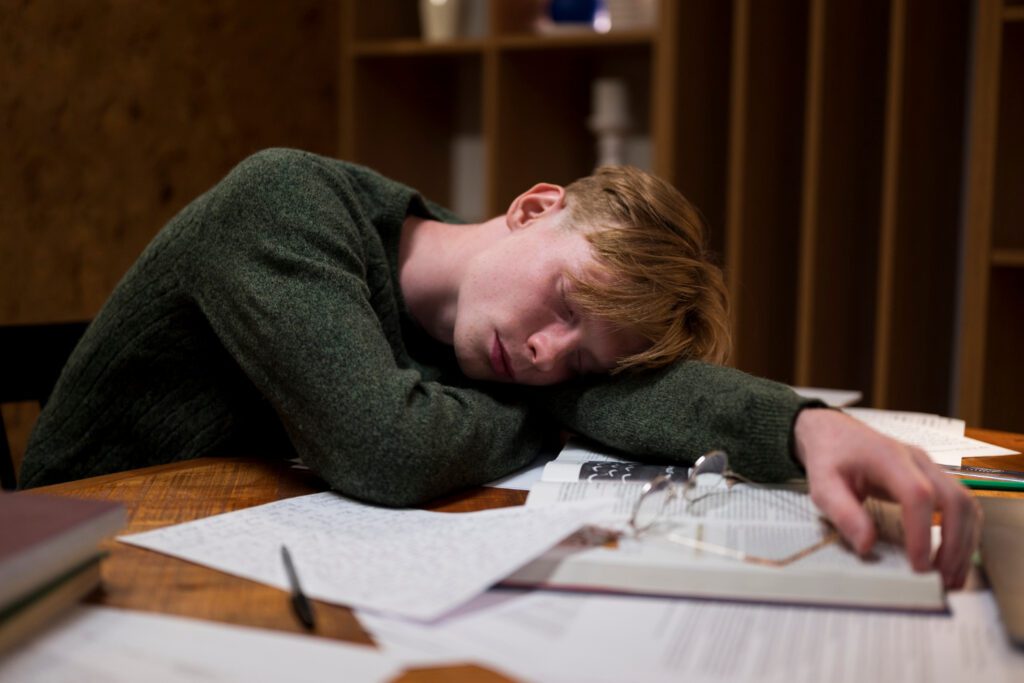10 Common Signs of Sleep Deprivation in Teenagers
Teenagers need more sleep than adults, but they often get much less than they should. Whether it’s school pressure, screen time, or social life, the lack of rest can seriously affect their mood, health, and daily performance. That’s why understanding the signs of sleep deprivation in teenagers is so important. According to the Sleep Foundation, teens should aim for 8–10 hours of sleep per night to stay healthy and alert.
If you’re a parent, teacher, or teen yourself — recognizing these signs early can help you take small steps toward better sleep and a healthier mind.
Why Sleep Matters So Much for Teens
During the teenage years, the brain and body are developing rapidly. Sleep helps regulate mood, sharpen memory, and support growth. Without enough rest, teenagers can quickly become overwhelmed and even physically unwell.
Experts recommend 8–10 hours of sleep each night for teens — but most don’t get nearly that much.

1. Constant Fatigue
This is often the first and most obvious sign. Teens who are sleep-deprived may feel tired even after waking up, or struggle to stay awake during the day — especially in the morning.
If your teen is always sleepy, even after a full night’s rest, sleep debt could be the cause.
2. Irritability or Mood Swings
Sleep affects how we manage emotions. When teenagers don’t get enough rest, they may become easily frustrated, snappy, or overly emotional.
This isn’t just “teen attitude” — it could be a lack of rest showing up as mood swings.
3. Trouble Concentrating in Class
Lack of sleep slows down brain function. Teens may have difficulty staying focused, remembering details, or following lessons in school.
One of the most common signs of sleep deprivation in teenagers is a drop in academic performance.
4. Falling Asleep at Odd Times
Do they nap after school? Struggle to stay awake while studying? These unusual sleep patterns are the body’s way of trying to catch up on missed rest.
Frequent napping during the day often points to poor nighttime sleep quality.
5. Increased Anxiety or Sadness
There’s a strong link between sleep and mental health. Teens who don’t get enough sleep may feel anxious, withdrawn, or even depressed.
A tired brain can’t process emotions properly, making everything feel more overwhelming.
6. Poor Decision-Making
Teens who are sleep-deprived often act impulsively or take unnecessary risks — from reckless driving to skipping important responsibilities.

Lack of sleep weakens the part of the brain responsible for judgment and self-control.
7. Changes in Appetite
Sleep affects the hormones that regulate hunger. A sleep-deprived teen might overeat, especially sugary or salty snacks, or feel no appetite at all.
Sleep and nutrition are deeply connected — both affect energy and mood.
8. Dark Circles or Puffy Eyes
Not every tired teen shows visible signs, but some may develop dark under-eye circles or a dull complexion. Their eyes may look glassy or puffy.
If they look exhausted, chances are, they probably are.
9. Trouble Waking Up
If your teen hits snooze over and over again, or needs a lot of effort to get out of bed, it could signal a major lack of quality sleep.
A healthy sleep cycle allows the body to wake up gradually, not in a daze.
10. Relying on Caffeine or Energy Drinks
Many teens turn to coffee or energy drinks to get through the day — a short-term fix that can actually make sleep problems worse.
Overuse of caffeine is one of the clearest signs of sleep deprivation in teenagers.
What Can Help?
If you recognize any of these signs in your teen, here are a few gentle changes that can help:
- Set a regular sleep schedule (even on weekends)
- Create a calming bedtime routine without screens
- Keep the bedroom dark and cool for better rest
- Limit caffeine after noon
- Encourage short naps only before 3 PM
Supporting good sleep is one of the kindest things we can do for growing minds.
Final Thoughts
The early signs of sleep deprivation in teenagers can be subtle, but they add up fast. A little awareness — and a lot of rest — can make a big difference in a teen’s mood, energy, and overall wellbeing.
FAQ: Signs of Sleep Deprivation in Teenagers
1. How many hours of sleep should a teenager get?
Teens need about 8 to 10 hours of sleep each night to function well.
2. Is oversleeping a sign of sleep deprivation?
Yes — if a teen sleeps excessively on weekends, it could be their body trying to make up for lost sleep during the week.
3. Can school stress cause sleep deprivation?
Absolutely. Homework, exams, and social pressures can make it hard for teens to fall or stay asleep.
4. Should I be worried if my teen naps every day?
Frequent napping may indicate that nighttime sleep isn’t deep or long enough.
5. What’s the best way to help a sleep-deprived teen?
Start with a consistent bedtime, reduce screen time before bed, and make the sleep environment quiet and cozy.

Pingback: How to Sleep Better During Pregnancy: 9 Helpful Tips
Pingback: Sleep Deprivation Symptoms: Early Signs and Health Effects
Pingback: How to Sleep When You’re Stressed About Work